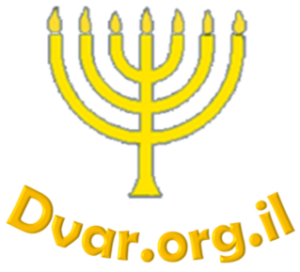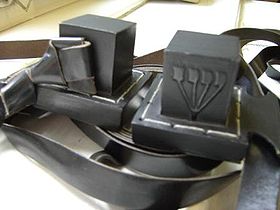 “And Hashem said to Moshe, ‘Speak to the Cohanim, the sons of Aharon, saying to them…’” Rashi quotes the Rabbis of the Talmud, who say that the repetition of the word “say” in the verse comes to teach that Moshe is to instruct the Cohanim to instruct, in turn, their children. The halacha we learn from this is that parents are forbidden to feed their children non-Kosher food, even if the particular Kashrut issue is only a Rabbinic decree. As the portion continues, the Torah says that the Cohanim are holy and, again, that they have been made holy. Each time, Rashi points out that this holy state is something which the Cohanim have “against their will.” R. Eliahu explains that this is linked to the earlier issue of instructing the children. From this we learn that one must be very careful with one’s actions because one’s children learn from what they see. This way, even if one told his children to act differently, the order wouldn’t be listened to because it contradicts everything the child has seen. So the imperative to teach one’s children comes out in two different ways: Therefore, the verse also tells the adults to watch their own actions as part of teaching their children. And if a man will say that none of this applies to him, one should know that even though it is addressed to the Cohanim, it includes every person. A person’s soul, coming from such an exalted source, always seeks to fulfill the precepts of the Torah and to seek holiness. Even if a person doesn’t feel like pursuing these goals, the Torah says that a person’s connection to holiness remains nevertheless. It is “against your will”; a person’s inherent holiness is inescapable and therefore one must conduct oneself in accordance with holiness. If a person agrees to seek this holiness, he will surely receive assistance from Hashem, as the verse says, “for I, the Holy One, make you holy” – you make yourselves holy and I will help you go further. “You shall count for yourselves from the day after the day of rest, from the day that you brought the sacrifice of the Omer to be waved; it shall be seven full weeks” (Leviticus 23:15). The mitzvah of counting the Omer from the day after Pesach until the holiday of Shavuot is unique. On the one hand, it is only a preparation and the counting is an expression of our expectations to reach the great day commemorating the giving of the Torah. On the other hand, counting the Omer is a mitzvah in itself. It requires recitation of a brachah to acknowledge G-d because He sanctified us with His commandments and commanded us to count the Omer. The combination of these two separate qualities in one act leads to the understanding that the act of preparation sanctifies and purifies a person. It raises him from level to level until the point that it could be said that if we had only been commanded to do the preparation by counting the Omer and the Torah had not been given to us – “dayaynu,” it would have been enough for us. Even if a person were prevented from celebrating the holiday of Shavuot, but he counted the forty nine days of the Omer, then he fulfilled the mitzvah in its entirety. It is written, “Turn away from evil, and do good…” (Psalms 37:27). The days of counting the Omer can be considered equivalent to “turn away from evil”. By turning away from evil a person prepares himself to “do good” when he accepts the Torah and fulfils her mitzvot. Although the days of counting the Omer are a preparation to achieve the goal, G-d’s giving of the Torah was a gift which we did not necessarily deserve. Nevertheless, the quality of a person becomes apparent by the effort and strength which he exerts during the preparation to merit by his own labour, as much as possible, to this wonderful gift. Furthermore, it is the nature of most people to live with expectations for the future. A person runs around throughout the day with the expectation that at the end of the day he will be able to rest in his home. During the entire week he works in order that he can enjoy himself on the weekend. All his days a person awaits and looks forward to the time of his retirement when he will be free to enjoy the fruits of his labours. And all this is on the condition that he will have the chance to reap his rewards. Thus his days pass in expectancy, waiting for the end of his toil when he will be able to enjoy. However, just as the period of preparation when the Omer is counted is a mitzvah in itself, and consequently a goal in itself, so all the periods of preparation and expectancy in our lives should be considered. We should be happy and joyous with those periods just like we expect to be happy during the periods of enjoyment. Since the goal is desirous and worthwhile, then the period of preparation and toil that a person is approaching the goal and coming closer to finally achieving it, is also a cause for joy and happiness. A person should bless them and thank G-d every day for the chance of receiving them. “I will be sanctified in the midst of the children of Israel; I am G-d who sanctifies you” (Leviticus 22:32). The sefer “Zichron Ya’akov” tells some of the heroic stories of the “cantonists,” the children who were kidnapped from their homes in order to be inducted into the army of Czar Nicholas. The officers of the brigade in which many cantonists had been placed were expecting a visit of the Czar in the year 5600 (1840). They wanted to show him what a splendid job they were doing re-educating these Jewish children. Therefore, they prepared a mass, baptismal conversion along the bank of the river which went through the town of Kuyzan in Russia. The children were brought from the canton to the river. Priests of the Russian Church dressed in their finest ceremonial robes were waiting for the children there. The carriage of Czar Nicholas approached. When the Czar came from his carriage, he ordered the children to enter the water to be baptised. They answered with one mind and one heart, “We will do as you say”. When they all entered the river the Czar was amazed by the discipline and the stupendous sight. The water covered the children…, but then only bubbles came up. The children had drowned themselves in order to sanctify the name of G-d with one mind and one heart in front of Czar Nicholas. Concerning them it is written, “…I will return them from the depths of the sea” (Psalms 68:23). Later on in the sedra, we are told of a Jew who committed the sin of blaspheming the Name of G-d. Rav Hirsch notes that the Torah mentions the mother’s name only after the son had sinned. Prior to this sin, he is referred to simply as the son of an Israelite woman. Shelomit, the daughter of Divri, was the only woman in Israel who had sinned in an immoral way. The Torah only mentions her name after her son’s sin because it is, at this point, that the consequence of her immorality is shown. Without this, such an outbreak of depravity would never have occurred in Yisroel. The horror of the enormity of the son’s crime showed up the mother, Shelomit, as the actual originator of the deed. The Peninim on the Torah adds that a person may think he has deceived the world, by veiling his actions with a facade of piety, his iniquities will become apparent through his child’s debasing activity, which will return to haunt and castigate him. SHABBAT SHALOM |





